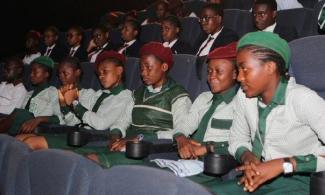
UNESCO has in its recent report shown that Nigeria and some other countries failed to meet the project Education for all by 2015. So what next? and what are the plans on ground ahead of the new projection.
The United Nations Educational, Scientific and Cultural Organisation UNESCO report on Education has shown that Nigeria is among other over 80 countries that have failed to meet the Education for All Target by 2015.
googletag.cmd.push(function() { googletag.display('content1'); });
UNICEF recently revealed that about 10.8 Million Nigerian Children of School age are not in School While UNESCO puts the total global figure at over 58 Million. It invariably means that Nigeria has a larger chunk of the percentage of Children not in school.
The report also revealed that not less than 100 Million Children did not finish their Basic primary education and worst affected is the girl- child .
It is equally surprising that though the number of Illiterate Adults dropped by 4% from 8% and of the total number of 781 Million Illeterates over the world,two-thirds of them are women.
googletag.cmd.push(function() { googletag.display('content2'); });
It is quite disheartening to say that most of the problems faced by the Nigerian Children apart from poverty include the un envisaged Insecurity that has claimed many lives and has separated many from Schools especially the North East Nigeria which has been plagued with Boko Haram Insurgency.
In the other areas of the Northern Nigeria, many of these children are given out in early marriages just because of cultural beliefs.
The Eastern Part of the Country where priority is given to girl child education, the boys are exposed to trading and other forms of skill acquisition at an early age thereby substituting education for business.
The South and West are not left out as most of these children are made to work as households and hawkers.
In as much as the present administration put up measures to help contain this menace through provision of funding of the Universal basic Education and the Almajiri school system, it has become imperative for the incoming administration to set up an agenda which will help encourage early education in Nigeria and as well improve the standards generally.
Ahead of the UNESCO’s World Education Forum coming up next month in Incheon, South Korea, Nigeria team must put together a fool proof plan that will enable us show good rating and meet the new Education For All target set for 2030.
Prominent among issues to be addressed is better protection for our Schools to guard against future kidnap by insurgents and miscreants.
There is need to critically look at what we have presently and appraise how the educational sector has fared in Nigeria, identify the Challenges and priority areas that need to be urgently attended to.
One of them is funding. The budget for 2015 on education is about Four Hundred and Ninety Two Billion Naira which represent about ten percent of the total budget. An increase to about 20 to 30 percent will adequately take care of education and as well enable Nigeria meets its target by 2030.
Of these funds, priority attention should be focused on Pre- Primary, Primary and Secondary Education because they form the bedrock of sound learning for any Child.
Communities, Private Sector and Non Governmental Organisations must be encouraged to partner with Government to ensure the less privilege Children have access to AFFORDABLE quality Education.There is no gain saying that Government alone cannot achieve this feat.
Sensitisation and re orientation of the rural Communities on the Importance of Education is also key. As such there is need to develop Strategic plans both short and long term to make each stage of this agenda realistic and achievable.
Attention must be paid to Structures and tools for learning. Most old Government Schools still train children in dilapidated buildings which must be looked into. Most Schools in the Urban Areas of the country cannot boast of having functional Libraries not to talk of the rural areas. Public and private partnership should be encouraged especially E-Libraries since Nigeria is fast becoming globalised with at least 81 Million Internet users.
Training and retraining of the Manpower in Education is also critical if Nigeria is to encourage many parents to trust Government owned schools. They need to be constantly updated to enhance their careers too and meet up with the Global Standards cannot be overemphasised.
googletag.cmd.push(function() { googletag.display('comments'); });